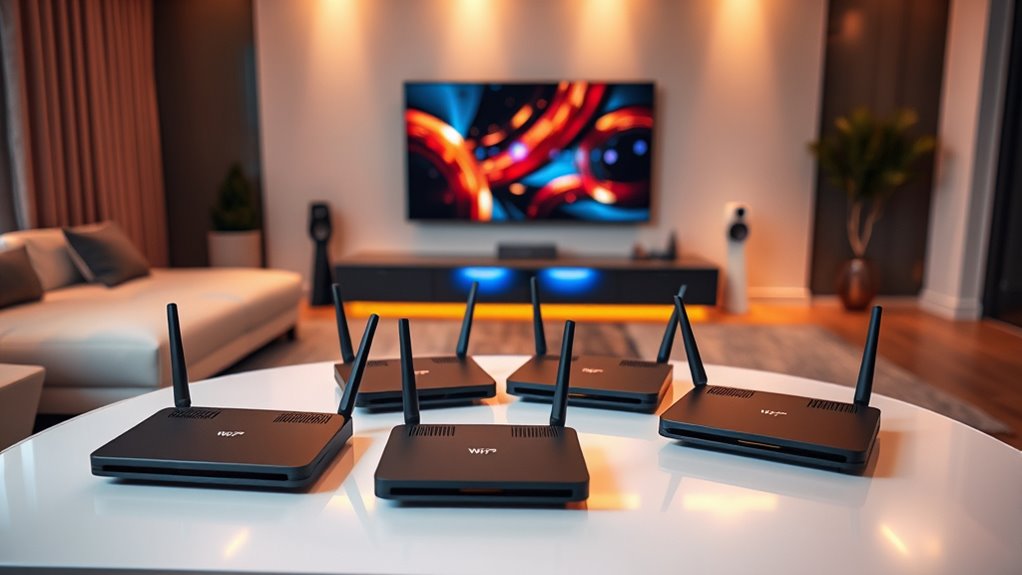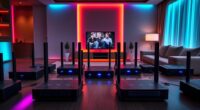In 2025, I’ve seen incredible Wi-Fi 7 routers like ASUS RT-BE86U, Archer BE600, and the NETGEAR RS90, offering speeds up to 19 Gbps and seamless connectivity for large homes and busy offices. These models support multi-band, multi-link operation, mesh systems, and multi-gig ports for top performance. If you’re curious about which router fits your needs and how they maximize speed and coverage, there’s much more to explore.
Key Takeaways
- Wi-Fi 7 routers support ultra-fast speeds up to 19 Gbps, ideal for demanding activities like 8K streaming and gaming.
- They feature multi-band, multi-link, and 4096-QAM technologies to maximize data throughput and reduce latency.
- Many models offer extensive coverage through mesh systems and multiple high-speed wired ports, suitable for large homes or offices.
- Advanced security features like WPA3 and network segmentation ensure safe, protected internet experiences.
- Future-proof with multi-gigabit support, multi-band operation, and compatibility with evolving devices in 2025.
ASUS RT-BE58U WiFi 7 Router
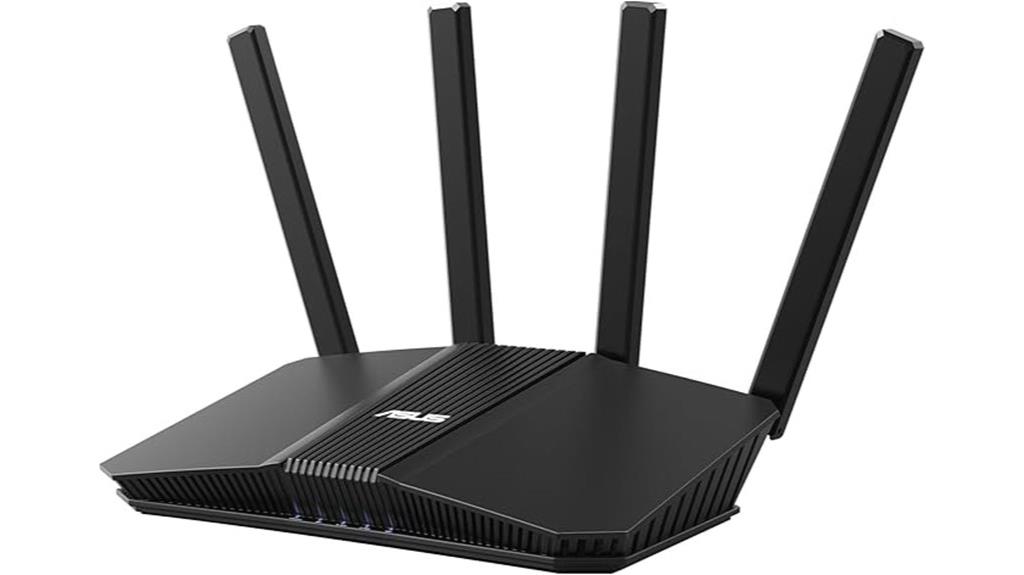
If you’re looking for a high-performance Wi-Fi 7 router that can handle multiple devices seamlessly, the ASUS RT-BE58U is an excellent choice. It supports WiFi 7 (802.11be) dual-band with speeds up to 3600 Mbps, thanks to 4096-QAM, 160MHz bandwidth, and multi-link operation. The router features a 2×2 dual-band setup, with 688 Mbps on 2.4GHz and 2882 Mbps on 5GHz, making it particularly faster than previous models. Its 2.5G port, four 1G ports, and versatile WAN options ensure excellent connectivity options. Plus, with security features like AiProtection Pro and parental controls, it provides both speed and peace of mind.
Best For: households or small offices seeking a high-speed, reliable WiFi 7 router capable of supporting multiple devices with strong security features.
Pros:
- Supports WiFi 7 with speeds up to 3600 Mbps for future-proof performance
- Easy setup and management via web interface with comprehensive controls
- Robust security with AiProtection Pro, parental controls, and versatile connectivity options
Cons:
- Some users report weaker signals compared to previous models
- Limited aesthetic appeal, prioritizing functionality over design
- Potentially higher cost, though often available at a good value during sales
ASUS RT-BE86U BE6800 Dual-Band WiFi 7 Router
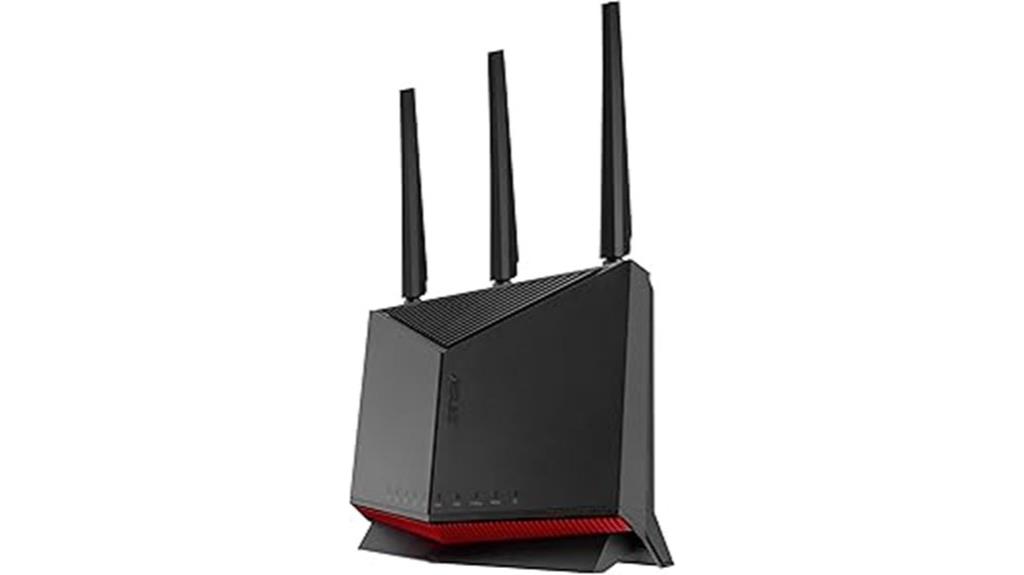
The ASUS RT-BE86U BE6800 Dual-Band WiFi 7 Router stands out as an ideal choice for those demanding high performance and future-proof connectivity. It supports WiFi 7 (802.11be), delivering up to 6800 Mbps through Multi-link Operation on dual bands, with a powerful quad-core 2.6 GHz CPU that handles demanding tasks like 4K streaming and online gaming. Equipped with ultrahigh-speed 10G Ethernet ports, including a 10G WAN/LAN and multiple 2.5G LAN ports, it’s perfect for multi-gig internet plans. Users enjoy stable, fast connections and excellent coverage, even in interference-heavy environments. Its advanced features ensure reliable, high-capacity home networking for years to come.
Best For: users seeking a high-performance, future-proof WiFi 7 router capable of handling demanding tasks like 4K streaming, gaming, and multi-gig internet plans with robust coverage and security.
Pros:
- Supports WiFi 7 (802.11be) with dual-band throughput up to 6800 Mbps for ultra-fast connections
- Equipped with ultrahigh-speed 10G Ethernet ports, including 10G WAN/LAN and multiple 2.5G LAN ports for multi-gig internet plans
- Features advanced mesh networking, AiProtection security, and easy smart home integration for reliable and secure connectivity
Cons:
- Web interface may be complex for beginners despite its feature-rich design
- Premium price point may be a barrier for budget-conscious users
- Large feature set might require a learning curve for full utilization
TP-Link Tri-Band WiFi 7 Router Archer BE600

The TP-Link Tri-Band WiFi 7 Router Archer BE600 stands out as an excellent choice for large households or small offices that demand high-speed, stable internet across numerous devices. It leverages advanced WiFi 7 features like Multi-Link Operation, 4K-QAM, and 320 MHz channels, delivering up to 9.7 Gbps total bandwidth. With coverage up to 2,600 sq. ft. and support for 120 devices, it’s perfect for streaming 4K/8K content, gaming, and smart home setups. Equipped with multiple multi-gigabit ports, a USB 3.0 port, and enhanced security via WPA3, it’s a future-proof, reliable router for demanding environments.
Best For: households or small offices requiring high-speed, stable WiFi coverage for multiple devices, streaming, gaming, and smart home applications.
Pros:
- Supports advanced WiFi 7 features with total bandwidth of 9.7 Gbps for fast, seamless connectivity
- Covers up to 2,600 sq. ft. and supports up to 120 devices simultaneously
- Equipped with multi-gigabit ports, USB 3.0, and enhanced security features like WPA3
Cons:
- Priced around $150, which may be high for budget-conscious users
- Overheating issues can occur without proper cooling solutions like fans
- Larger size (11.29 x 6.02 x 1.87 inches) may require adequate space for optimal placement
TP-Link Tri-Band WiFi 7 Router (Archer BE550)

For anyone seeking a high-performance, future-proof WiFi router, the TP-Link Archer BE550 stands out with its impressive tri-band speeds reaching up to 9.2 Gbps. It leverages WiFi 7 features like 320 MHz channels, 4K-QAM, and Multi-Link Operation (MLO) for lightning-fast connections. Supporting 6 streams and full 2.5 Gbps WAN and LAN ports, it’s perfect for 4K/8K streaming, AR/VR gaming, and quick downloads. Its six antennas with Beamforming guarantee reliable coverage over about 2,000 sq ft. Plus, EasyMesh compatibility makes expanding your network seamless, reducing dead zones. It’s a sleek, secure, and easy-to-use router built for the future.
Best For: tech enthusiasts and smart home users seeking a high-speed, future-proof WiFi 7 router with extensive coverage and easy expansion options.
Pros:
- Ultra-fast tri-band speeds up to 9.2 Gbps, ideal for demanding streaming and gaming.
- Supports EasyMesh for seamless network expansion and reduced dead zones.
- Advanced security features including VPN, HomeShield, and parental controls for comprehensive protection.
Cons:
- Premium price point around $269, which may be high for budget-conscious buyers.
- Large size with six antennas may require ample space for optimal placement.
- Some advanced features may have a learning curve for non-technical users.
NETGEAR Nighthawk WiFi 7 Router (RS90)
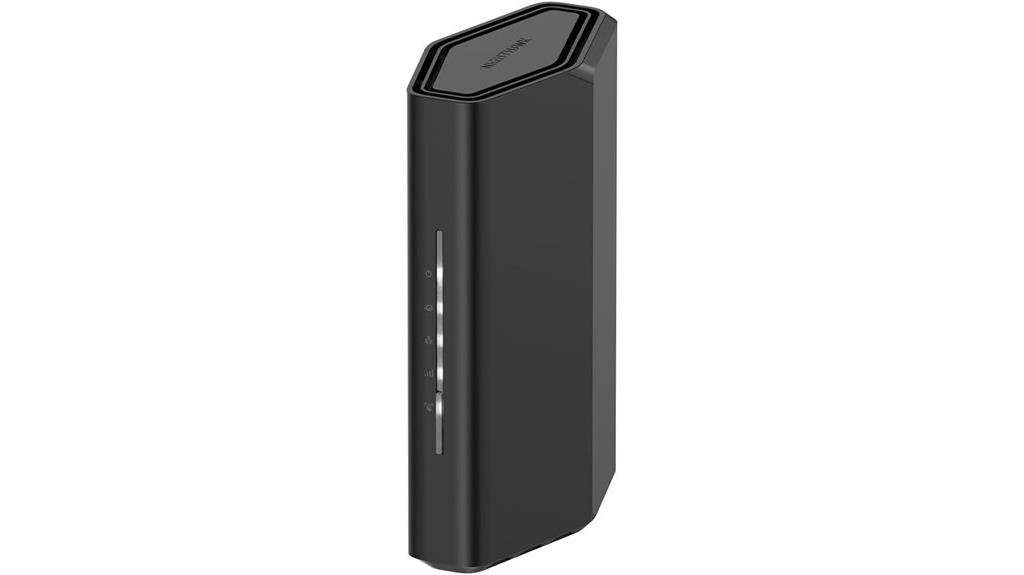
If you’re looking for a router that combines blazing-fast speeds with reliable coverage, the NETGEAR Nighthawk WiFi 7 Router (RS90) is an excellent choice. It delivers WiFi 7 speeds up to 3.6 Gbps, perfect for gaming, streaming, and video calls. Its compact design features high-performance antennas that cover up to 2,000 square feet and support up to 50 devices. With a 2.5 Gigabit internet port, it’s compatible with the latest fiber and cable services—though you’ll need a separate modem. Built-in security, including NETGEAR Armor, keeps your network safe. Plus, free expert support guarantees easy setup and ongoing maintenance.
Best For: households seeking ultra-fast WiFi speeds with reliable coverage for gaming, streaming, and multiple devices.
Pros:
- Supports WiFi 7 speeds up to 3.6 Gbps for high-performance connectivity
- Covers up to 2,000 sq. ft. and supports up to 50 devices, ideal for busy homes
- Equipped with a 2.5 Gigabit internet port compatible with fiber and cable services
Cons:
- Requires a separate modem, as it is a router only
- No coax input, limiting options for certain internet setups
- Premium features like NETGEAR Armor may require additional subscription fees
NETGEAR Orbi 970 Series WiFi 7 Mesh Network System
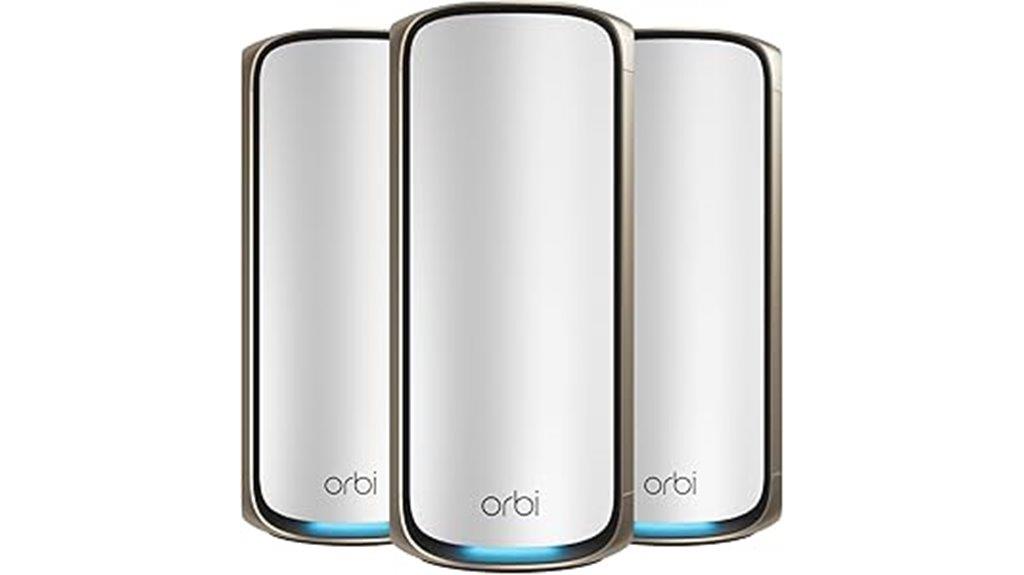
Designed for large homes and demanding users, the NETGEAR Orbi 970 Series WiFi 7 Mesh Network System delivers blazing-fast speeds up to 27Gbps, making it ideal for high-bandwidth activities like 8K streaming, gaming, and virtual reality. Its exclusive Quad-band technology with Enhanced Dedicated Backhaul guarantees consistent, fast WiFi across all areas, even yards or basements. Covering up to 10,000 sq. ft. and supporting 200 devices, it features a 10 Gig internet port for future-proof multi-gig connections. Setup is straightforward via the Orbi app, though some users find the units bulky. Overall, it’s a powerful, extensive system for large, tech-heavy homes.
Best For: large, tech-heavy homes requiring ultra-fast, comprehensive WiFi coverage for multiple high-bandwidth devices and demanding activities.
Pros:
- Supports speeds up to 27Gbps with WiFi 7, ideal for 8K streaming, gaming, and VR.
- Extensive coverage up to 10,000 sq. ft. with support for 200 devices.
- Features exclusive Quad-band technology with Enhanced Dedicated Backhaul for stable, fast connections across all areas.
Cons:
- Units are bulky and may be less discreet for placement.
- Some users report reliability issues such as reboots, connection drops, and system instability.
- Premium price point with optional paid subscriptions for security and advanced features.
NETGEAR Nighthawk WiFi 7 Router (RS280S)

The NETGEAR Nighthawk WiFi 7 Router (RS280S) stands out as an excellent choice for gamers and streamers who demand lightning-fast speeds and reliable coverage. With WiFi 7 speeds reaching up to 9.2 Gbps, it’s perfect for gaming, streaming, and video calls across multiple devices. Its sleek, compact design includes high-performance antennas that cover up to 2,500 sq. ft., ensuring seamless connectivity throughout your home. Equipped with multiple Ethernet ports, including a 2.5 Gig port, it supports fast wired connections. Built-in security features like NETGEAR Armor and automatic updates keep your network protected, making it a top choice for high-performance home internet.
Best For: gamers, streamers, and tech enthusiasts seeking ultra-fast WiFi speeds and reliable coverage for multiple devices in a large home.
Pros:
- Blazing-fast WiFi 7 speeds up to 9.2 Gbps for smooth gaming, streaming, and video calls
- Covers up to 2,500 sq. ft. with high-performance antennas for seamless connectivity
- Includes multiple Ethernet ports, including a 2.5 Gig port, for fast wired connections
Cons:
- Requires a separate modem for internet access, as it is not a modem itself
- Armor subscription for security lasts only one year, requiring renewal for continued protection
- May be more expensive compared to dual-band or WiFi 6 routers with similar features
TP-Link Deco BE63 Tri-Band WiFi 7 Mesh System
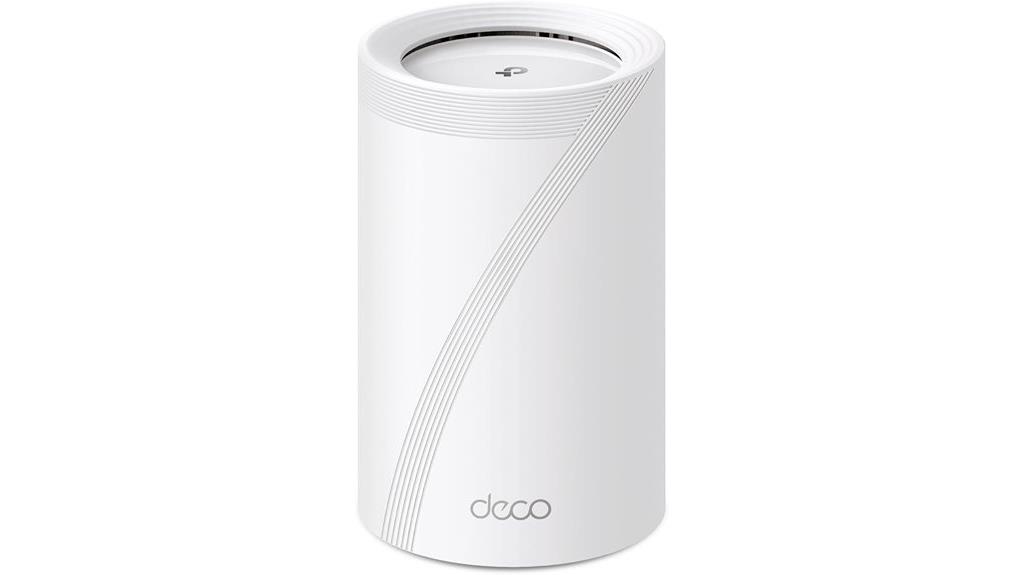
For homeowners seeking seamless coverage and ultra-fast speeds, the TP-Link Deco BE63 Tri-Band WiFi 7 Mesh System stands out as a top choice. It delivers up to 10 Gbps across 6GHz, 5GHz, and 2.4GHz bands, utilizing advanced Wi-Fi 7 features like Multi-Link Operation and 320 MHz channels. Covering up to 3,000 sq.ft. and supporting over 200 devices, it’s perfect for streaming 4K/8K content, gaming, and smart homes. The system offers reliable, seamless connectivity with AI-driven roaming, a simple app for setup and management, and multi-gig wired ports, making it a versatile and powerful mesh solution.
Best For: homeowners and tech enthusiasts seeking ultra-fast, reliable Wi-Fi coverage for large homes and high-demand smart device environments.
Pros:
- Ultra-fast speeds up to 10 Gbps across multiple bands, ideal for streaming and gaming
- Supports over 200 devices simultaneously without performance loss
- Easy setup and management via the intuitive Deco app with AI-driven seamless roaming
Cons:
- Early-stage Wi-Fi 7 benefits; many devices do not yet support the 6 GHz band
- Managing large numbers of IoT devices can be challenging, with some connectivity issues reported
- Advanced security features like parental controls may require additional subscriptions
TP-Link Tri-Band WiFi 7 Router (Archer BE800)

If you’re seeking a high-performance Wi-Fi 7 router that can handle demanding tasks like 4K streaming and immersive gaming, the TP-Link Archer BE800 stands out with its impressive speeds of up to 19 Gbps across quad-band channels. It leverages advanced Wi-Fi 7 features like Multi-Link Operation, 4K-QAM, and 320 MHz channels, supporting devices such as Pixel 7 and MacBook Pro 2023. Equipped with 8 high-performance antennas, 2×10G WAN ports, and support for EasyMesh, it offers reliable, expansive coverage. Its LED screen provides real-time network stats, and TP-Link HomeShield enhances security. Overall, it’s a future-proof, powerful choice for large homes and high-bandwidth needs.
Best For: those seeking a high-speed, future-proof Wi-Fi 7 router capable of handling demanding tasks like 4K streaming, immersive gaming, and large home coverage.
Pros:
- Supports Wi-Fi 7 with speeds up to 19 Gbps, ideal for high-bandwidth activities
- Equipped with 8 antennas and EasyMesh support for reliable, expansive coverage
- Advanced security features via TP-Link HomeShield and real-time network analytics
Cons:
- Premium price point (~$258) may be a barrier for some users
- Firmware updates are needed to unlock full Wi-Fi 7 capabilities as the technology is still emerging
- Some users experience device bouncing in mesh setups, though mitigated by internal antennas
TP-Link Tri-Band WiFi 7 Router Archer BE700
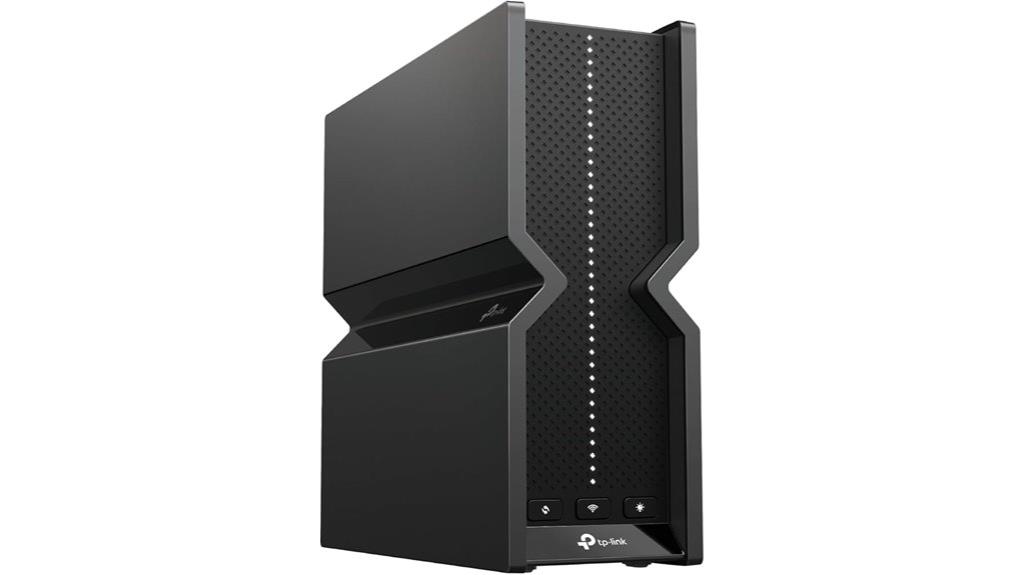
Looking for a powerful Wi-Fi 7 router that can handle demanding activities like 4K streaming, gaming, and large downloads? The TP-Link Archer BE700 is exactly that. It offers tri-band speeds up to 15Gbps, leveraging Wi-Fi 7 features like Multi-Link Operation, 4K-QAM, and channels up to 320 MHz for reduced latency and boosted throughput. Equipped with multiple gigabit ports, including a 10 Gbps WAN and 2.5 Gbps LAN, it ensures fast wired connections. Six antennas with Beamforming deliver broad, reliable coverage. Easy to set up via the TP-Link Tether app, it’s ideal for busy homes needing seamless, high-speed connectivity across multiple devices.
Best For: households and remote workers seeking high-speed, reliable Wi-Fi 7 coverage for streaming, gaming, and large downloads.
Pros:
- Tri-band speeds up to 15Gbps for seamless multitasking and demanding applications
- Multiple gigabit ports, including a 10 Gbps WAN and 2.5 Gbps LAN, for fast wired connections
- Wide coverage with six antennas and Beamforming technology ensuring strong signals throughout large homes
Cons:
- Advanced features like Multi-Link Operation may require compatible devices and regional support
- Premium price point compared to typical routers, which might be a consideration for budget-conscious users
- Some features, such as security protections, require paid subscriptions through TP-Link HomeShield
ASUS RT-BE88U WiFi 7 Dual-Band Router

The ASUS RT-BE88U WiFi 7 Dual-Band Router stands out as an excellent choice for power users who need blazing-fast speeds and extensive wired connectivity. It delivers up to 7200 Mbps with WiFi 7 technology, thanks to Multi-Link Operation and 4096-QAM modulation. Its impressive wired options include a 10G SFP+ port, dual 10G ports, and multiple 2.5G and 1G ports, supporting up to 34G WAN/LAN capacity. Powered by a quad-core 2.6GHz CPU, it handles demanding tasks smoothly. Easy to set up, secure with AiProtection Pro, and compatible with AiMesh, it’s perfect for complex, high-performance networks.
Best For: Power users and demanding households seeking ultra-fast WiFi 7 speeds, extensive wired connectivity, and reliable, high-performance networking.
Pros:
- Supports blazing-fast speeds up to 7200 Mbps with WiFi 7 technology.
- Extensive wired options including 10G SFP+ and dual 10G ports for high-capacity wired connections.
- User-friendly setup with robust security features like AiProtection Pro and seamless mesh compatibility.
Cons:
- Some users report occasional VPN stability issues.
- Performance may drop over longer distances or under heavy load.
- Compatibility concerns with certain modems and limitations in advanced configurations like IPTABLES rules.
ASUS RT-BE86U Dual-Band WiFi 7 Router
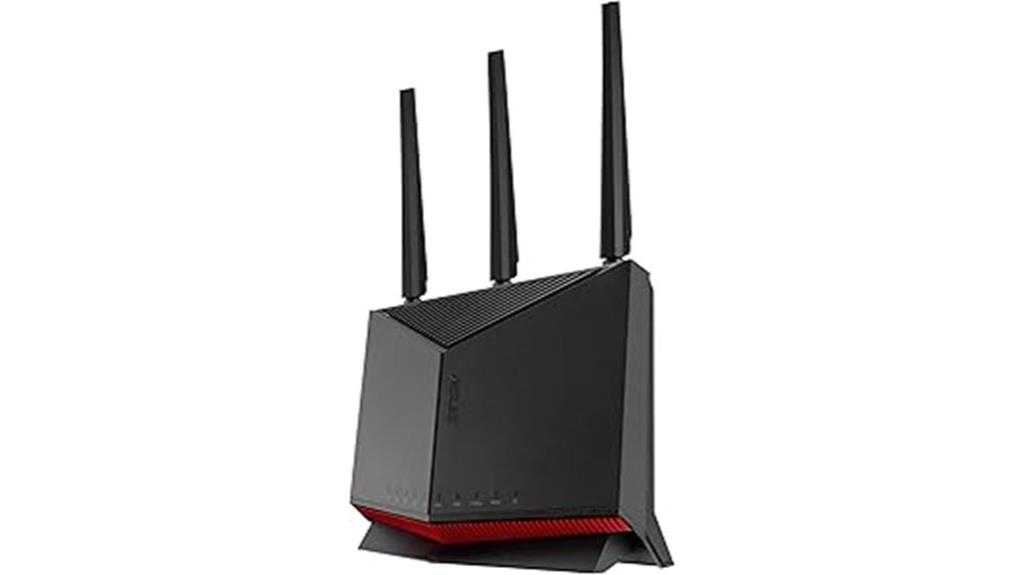
The ASUS RT-BE86U Dual-Band WiFi 7 Router stands out as an ideal choice for users who demand high-speed, reliable internet across large or multi-story homes. It supports WiFi 7 (802.11be), delivering up to 6800 Mbps through Multi-link Operation on 2.4 GHz and 5 GHz bands. Powered by a quad-core 2.6 GHz CPU and ultrahigh-speed 10G Ethernet ports, it handles demanding tasks like 4K streaming and online gaming effortlessly. Its mesh compatibility via AiMesh ensures seamless coverage, while advanced features like AI WAN detection, multiple SSIDs, and robust security make setup and management simple. This router is built for future-proof, high-performance home networking.
Best For: households or small businesses seeking a high-speed, reliable, and future-proof WiFi 7 router with extensive coverage and advanced security features.
Pros:
- Supports WiFi 7 (802.11be) with up to 6800 Mbps throughput for fast, lag-free connections
- Advanced mesh compatibility with AiMesh for seamless large-area coverage
- Robust security with subscription-free AiProtection and easy remote management
Cons:
- Web interface may be overwhelming for beginners due to its extensive features
- Higher price point reflecting its advanced capabilities and future-proof design
- Requires compatible devices to fully utilize WiFi 7 speeds and features
ASUS RT-BE58U WiFi 7 Router with AI Mesh and 2.5G Port

If you need a high-performance router capable of handling multiple devices with ease, the ASUS RT-BE58U WiFi 7 Router is an excellent choice. It supports WiFi 7 (802.11be), delivering speeds up to 3600 Mbps with advanced features like 4096-QAM, 160MHz bandwidth, and multi-link operation for stable, smooth connections. The dual-band design includes a 2.5G port, four 1G ports, and versatile WAN options, making it perfect for busy households or small offices. Its AI Mesh compatibility guarantees seamless coverage expansion. Easy setup, robust security, and reliable performance make this router a future-proof option for those seeking lightning-fast internet.
Best For: households or small offices seeking a high-speed, reliable, and future-proof WiFi 7 router with extensive device support and advanced security features.
Pros:
- Supports WiFi 7 with speeds up to 3600 Mbps, ensuring ultra-fast connectivity
- AI Mesh compatibility for seamless coverage expansion across large areas
- Multiple WAN options, including a 2.5G port and USB tethering, for versatile network configurations
Cons:
- Slightly larger size may not suit very compact spaces
- Some users report weaker signals compared to previous models after extended use
- Premium features and specifications might be overkill for basic internet needs
TP-Link Deco BE23 Dual-Band WiFi 7 Mesh Router

Looking for a reliable mesh router that offers cutting-edge Wi-Fi 7 technology and seamless coverage? The TP-Link Deco BE23 delivers just that, with next-generation Wi-Fi 7 featuring 4-stream dual-band speeds up to 3.6 Gbps. It supports Multi-Link Operation, Multi-RUs, and 4K-QAM, providing maximum speeds of 2882 Mbps on 5GHz and 688 Mbps on 2.4GHz. Covering up to 2,500 sq. ft. and supporting 150 devices, it uses four high-gain antennas for strong signals. Two 2.5 Gbps ports ensure fast wired connections, while AI-Roaming and self-learning algorithms keep your network stable and seamless across all devices.
Best For: tech-savvy households and small offices seeking high-speed, reliable Wi-Fi 7 connectivity with extensive coverage and advanced security features.
Pros:
- Supports next-generation Wi-Fi 7 with speeds up to 3.6 Gbps for seamless high-bandwidth activities
- Covers up to 2,500 sq. ft. and supports 150 devices simultaneously, ideal for busy smart homes or small offices
- Features multi-link operation and AI-Roaming for stable, uninterrupted connectivity across all devices
Cons:
- Higher price point compared to older Wi-Fi standards or less advanced routers
- May require compatible Wi-Fi 7 devices to fully utilize the speed benefits
- Setup and configuration might be complex for users unfamiliar with mesh networking technology
Factors to Consider When Choosing Wi‑Fi 7 Routers

When choosing a Wi-Fi 7 router, I consider my speed and bandwidth needs to make certain of smooth streaming and gaming. I also look at the coverage area to make sure it fits my space, along with device compatibility and security features. Finally, I check the available wired and wireless ports to match my connection requirements.
Speed and Bandwidth Needs
Choosing a Wi-Fi 7 router requires careful consideration of speed and bandwidth needs, especially as more devices demand faster connections. Wi-Fi 7 supports multi-link operation (MLO), allowing simultaneous connections across multiple bands for higher overall speeds. These routers can deliver combined bandwidths exceeding 9 Gbps, perfect for activities like 8K streaming and online gaming. The use of 4096-QAM modulation and channels up to 320 MHz markedly boosts data rates compared to previous standards. With such high bandwidth capabilities, multiple devices can stream, download, and game without noticeable slowdown. Selecting a router with sufficient maximum throughput is essential to future-proof your setup, ensuring it can handle increasing internet speeds and the growing number of connected devices. Prioritizing speed and bandwidth needs helps you get the most out of Wi-Fi 7.
Coverage Area Size
To guarantee your Wi-Fi 7 router covers the entire home or office effectively, consider its antenna setup and beamforming capabilities. Routers with multiple high-gain antennas and advanced beamforming focus signals directly toward devices, ensuring consistent coverage. For larger spaces, mesh networking systems are ideal—they use multiple nodes to seamlessly extend Wi-Fi across thousands of square feet. The Wi-Fi 7 standard supports higher bandwidth channels (up to 320 MHz), which improve coverage and signal penetration in big environments. Keep in mind, the number of devices and traffic load also influence coverage quality; high-performance routers can maintain speed and stability over extensive areas. Finally, physical placement—central and elevated locations—significantly enhances overall coverage, reducing dead zones and optimizing signal reach.
Device Compatibility Factors
Making certain your devices can fully leverage the capabilities of a Wi-Fi 7 router is key to getting the most out of your network. First, check if your devices support Wi-Fi 7 (802.11be), so you can access maximum speeds and new features like Multi-Link Operation (MLO), 4096-QAM, and 320 MHz channels. Keep in mind that many existing devices still operate on Wi-Fi 5 or Wi-Fi 6, which may limit performance. It’s also important to verify whether your devices can connect simultaneously over multiple bands—2.4 GHz, 5 GHz, and 6 GHz—for better efficiency. Ultimately, think ahead and ensure future device compatibility, so your network remains fast and responsive as more Wi-Fi 7 gadgets become available.
Security and Privacy
As more devices connect to your Wi-Fi 7 network, prioritizing security and privacy becomes essential to protect your personal information and connected gadgets. WiFi 7 routers support advanced protocols like WPA3 encryption, which provides stronger protection against unauthorized access. Many models also feature integrated security tools such as AiProtection or HomeShield, helping guard against malware, phishing, and network intrusions. Secure network segmentation options, like guest networks or IoT-specific Wi-Fi, isolate sensitive devices and keep your main network safe. Regular firmware updates are critical, as they patch vulnerabilities and improve security over time. Additionally, voice control and remote management features let you monitor and adjust security settings conveniently from anywhere, enhancing your overall network privacy with minimal effort.
Wired Vs Wireless Ports
When selecting a Wi‑Fi 7 router, understanding the difference between wired and wireless ports can substantially impact your network’s performance. Wireless ports support multiple bands—2.4 GHz, 5 GHz, and 6 GHz—delivering high-speed Wi-Fi connections, but they can be affected by interference and distance. Wired ports, especially multi-gigabit Ethernet options like 2.5G, 5G, and 10G, provide faster, more stable connections ideal for gaming, streaming, and data-heavy tasks. The number and type of ports, including LAN, WAN, or SFP+, determine how well your router can connect to high-performance devices or multi-gig internet sources. Wired connections typically offer lower latency and higher reliability, making them a fundamental component for a robust, high-speed network.
Ease of Setup
Choosing a Wi-Fi 7 router with easy setup features can save you time and frustration. Many models offer user-friendly setup via dedicated mobile apps or web interfaces, making configuration simple even for beginners. Most support automatic detection of your internet connection type and provide guided setup wizards that walk you through each step. Plug-and-play installation is common, often taking less than 10 minutes from unboxing to full operation. Compatibility with existing devices and mesh systems further simplifies expansion, letting you integrate new routers without complicated reconfigurations. This streamlined process means you won’t spend hours troubleshooting or deciphering complex settings. Instead, you get a fast, hassle-free setup that gets your lightning-fast Wi-Fi up and running quickly, so you can start enjoying your improved internet experience sooner.
Future-Proof Features
To guarantee your Wi-Fi 7 router remains relevant as technology advances, look for models that support future-proof features like Multi-Link Operation (MLO) and 320 MHz channels, which maximize speed and reliability with compatible devices. These features enable faster data transfer and more stable connections, even in congested environments. Multi-gigabit Ethernet ports, such as 10G or 2.5G, ensure your wired connections keep pace with your wireless performance. Compatibility with upcoming Wi-Fi 7 devices guarantees peak performance as new gadgets and smart home products adopt the latest standards. Additionally, support for seamless mesh networking and EasyMesh makes expanding coverage straightforward. Built-in security features like WPA3 encryption and integrated protection help safeguard your network against evolving cyber threats, future-proofing your investment.
Frequently Asked Questions
How Does Wi‑Fi 7 Improve Security Features?
Wi-Fi 7 enhances security by implementing stronger encryption protocols like WPA3, making it harder for hackers to access your network. It also introduces improved device authentication and management features, giving you better control over connected devices. I find that these updates help protect my data and privacy more effectively. If you’re concerned about security, Wi-Fi 7 offers significant improvements to keep your online activities safer.
Are Wi‑Fi 7 Routers Compatible With Existing Devices?
You’re wondering if Wi-Fi 7 routers work with my existing devices. I found that most Wi-Fi 7 routers are backward compatible, meaning they support older Wi-Fi standards like 5 and 6. So, my current devices should connect without issues, though they won’t benefit from the new Wi-Fi 7 speeds. It’s a great way to future-proof my network while keeping my current gadgets working seamlessly.
What Is the Typical Setup Time for Wi‑Fi 7 Routers?
Ever wondered how long it takes to set up a Wi-Fi 7 router? Honestly, it’s pretty quick. Usually, I spend about 10 to 15 minutes on the initial setup, which involves connecting it to my modem, powering it up, and following the app or web instructions. Most modern routers are designed for ease, so I find that the process is straightforward and hassle-free, letting me enjoy faster internet sooner.
Do Wi‑Fi 7 Routers Support Gaming and Streaming Simultaneously?
Wi-Fi 7 routers are designed to handle gaming and streaming at the same time without issues. I’ve found they support multiple devices seamlessly, thanks to their advanced technology and increased bandwidth. Whether you’re gaming or streaming 4K videos, these routers manage everything smoothly. So, if you want a reliable connection for all your devices, Wi-Fi 7 routers are definitely up to the task, providing fast, stable internet everywhere in your home.
How Energy-Efficient Are Wi‑Fi 7 Routers Compared to Previous Versions?
Oh, the irony is rich—wondering if Wi-Fi 7 routers are more energy-efficient while they promise lightning-fast speeds. Honestly, they’re designed with smarter power management, so yes, they tend to use less energy than older models. It’s like upgrading to a sports car that’s also eco-friendly. So, while they deliver top performance, they’re also kinder to your energy bills and the planet. Who knew high speed could be green?
Conclusion
Choosing the right Wi-Fi 7 router is like finding the perfect key to open lightning-fast internet. With so many top-tier options in 2025, you can’t go wrong. Whether you need robust features or seamless mesh connectivity, these routers are ready to elevate your online experience. So, pick your champion and get ready to surf at the speed of light—your connected world is about to get a whole lot better.

